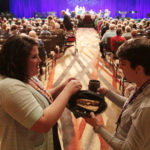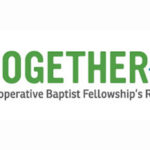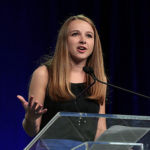ROSHARON—It’s 2:15 on a Thursday afternoon, and Butch Green is trying to figure out the correct pipe fitting for a prefabricated shower.
That’s not in Green’s job description for Cooperative Baptist Fellowship field personnel. But it aligns with Green’s heart, which propels him to serve people who have endured some of life’s harshest blows.
On this day, Green huddles with Peter Sar, a farmer, and Dale Feeler, a volunteer from First Baptist Church in Jefferson City, Mo. They’re standing in Sar’s home in rural Rosharon, south of Houston. Hurricane Harvey flooded Sar’s entire neighborhood of Cambodian refugees.
All in a day’s work

Solving construction problems is all in a day’s work—at least for the time being—for Green. After Harvey hit, he relinquished most of his day job to coordinate CBF disaster recovery along the Texas Gulf Coast. So now, he keeps tabs on homeowners’ and churches’ needs and handles logistics for volunteer recovery teams. Sometimes, he ponders a plumbing riddle.
From the road, Rosharon and most of the Houston area look normal. Floodwaters receded, leaving the landscape lush and green. But inside, flooded-out homes reveal a different story.
“Right now, everybody’s mucked out and dried out,” Green explained of homes stripped down to studs. “Supplies are beginning to be donated.”
Meanwhile, local CBF congregations, platoons of volunteers from churches elsewhere and CBF personnel are helping homeowners whose insurance and FEMA support aren’t enough to stabilize them again.
More volunteer groups needed
A cloud crosses Green’s face as he thinks about what lies ahead.
“I’m concerned, because (volunteer) groups are trailing off,” he said. Three will arrive before Thanksgiving, but none are set for December. One team will work in January, and two each are scheduled for spring break and next summer.
Sign up for our weekly edition and get all our headlines in your inbox on Thursdays
Green expresses confidence other CBF groups will make plans to help the region recover, but he hopes they’ll step up sooner rather than later.
“This is the optimal time for hanging sheetrock,” he said, noting many homes are ready to be refurbished. But he needs volunteers ready to put homes and lives back together.
Specialists are in demand, too. “We always can use plumbers and electricians,” he noted.
A long history of flexibility
Green’s flexibility—willingness to let go of ongoing ministries in order to facilitate something historically urgent—reflects the versatility that has marked the career he and his wife, Nell, have embraced across three decades and three continents.
They began in France in 1986 and a year later moved to Senegal, West Africa, where they served seven years.
The Greens joined CBF in 1994 and worked with Touching Miami With Love, which grew out of CBF response to Hurricane Andrew. Then they trekked back to Europe, to Belgium, where they worked with Muslims from North Africa.
Next, they returned to the United States and settled in South Carolina, teaching Christians how to relate to Muslims. A transfer to Canada fell through, and they worked in Baltimore for about six months, wondering where they should serve next.
Home again
That proved to be Houston, an assignment that brought them home to Texas in February 2011. Butch lived in Houston through the sixth grade and graduated from high school in Van. Nell grew up in South Louisiana but moved to Texas and graduated from high school in Madisonville.
“We felt coming here was a God thing, even though it happened in a round-about way,” he marvels. “Houston is the most diverse city in the nation, with 250,000 Muslims. We felt affirmed to be called here.”
Across the past seven years, the Greens have helped resettle refugees, who have flooded into Houston faster than to any other U.S. city; worked with international students; sponsored interfaith dialogues with Muslims, who worship in about 100 mosques in the area; and combatted human trafficking, a major scourge in the region.
‘All about the relationships’
Their initial response to Hurricane Harvey mirrored their ongoing ministries.
On Friday night, Aug. 25, Nell maintained ongoing text contact with a co-worker from Afghanistan whose family of six watched in horror as floodwaters rose up to their second-floor apartment.
Then they spoke on the phone with a friend, a former international student who earned her Ph.D. from the University of Houston and who was communicating with seven other international students who had crawled into an attic before climbing onto their roof and swimming to safety. Even later, they received a call from a partner in their trafficking ministry about a stranded client who seemed to be going into labor. Nell is a nurse, and just before the Greens headed into the storm, the young woman’s labor stopped.
“Those people all were affected in different ways, but they reflect three aspects of our ministry,” he recalls. “It’s all about the relationships. Those people contacted us because they trust us.”
Building and maintaining relationships is a key component of disaster recovery, he says. “We want to get (disaster recovery) work done. But relationships are 10 times more important. … After a few weeks, when the reality of Harvey soaked in, people felt the burden. We sat with them, talking and praying.”
And the Greens put feet to those prayers by facilitating CBF recovery efforts in and around Houston. Butch is hands-on, coordinating work sites. Nell keeps communication moving through social media.
They are focused on three areas:
- Rural Rosharon, home to the Cambodian refugee farmers.
- South Houston, where many of Houston’s Hispanic residents live and where Templo Bautista de Houston has been a hub of work.
- The Fifth Ward, an African-American community in the northeastern quadrant of the city, where Pleasant Hill Baptist Church and the Fifth Ward Community Redevelopment Corporation are providing energy and stability.
For his part, Green has found joy in his newfound on-demand ministry.
“It’s a blessing to see volunteers come and be what we’re supposed to be—the church helping people in need,” he explains. “We’re doing what CBF is all about—helping the marginalized, those who need help the most.
“We’re not huge, but we’re doing our best, and we’re here for the long haul.”
For more information or to register to help with Hurricane Harvey recovery:
- Visit CBF’s Hurricane Harvey webpage.
- Contact Green directly—(803) 517-3735; [email protected]
- Contact Anyra Cano, CBF’s Harvey-recovery coordinator—[email protected]














We seek to connect God’s story and God’s people around the world. To learn more about God’s story, click here.
Send comments and feedback to Eric Black, our editor. For comments to be published, please specify “letter to the editor.” Maximum length for publication is 300 words.